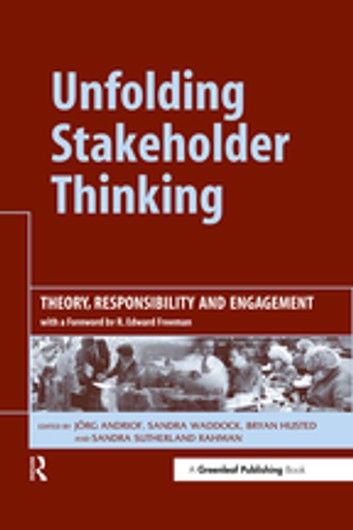| FindBook |
有 1 項符合
Unfolding Stakeholder Thinking的圖書 |
 |
Unfolding Stakeholder Thinking 作者:Jörg Andriof,Sandra Waddock,Bryan Husted,Sandra Sutherland Rahman 出版社:Taylor & Francis 出版日期:2017-09-08 語言:英文 |
| 圖書館借閱 |
| 國家圖書館 | 全國圖書書目資訊網 | 國立公共資訊圖書館 | 電子書服務平台 | MetaCat 跨館整合查詢 |
| 臺北市立圖書館 | 新北市立圖書館 | 基隆市公共圖書館 | 桃園市立圖書館 | 新竹縣公共圖書館 |
| 苗栗縣立圖書館 | 臺中市立圖書館 | 彰化縣公共圖書館 | 南投縣文化局 | 雲林縣公共圖書館 |
| 嘉義縣圖書館 | 臺南市立圖書館 | 高雄市立圖書館 | 屏東縣公共圖書館 | 宜蘭縣公共圖書館 |
| 花蓮縣文化局 | 臺東縣文化處 |
|
|
This book – the first of a two-volume series – argues that, today, stakeholder thinking has evolved into the study of interactive, mutually engaged and responsive relationships that establish the very context of doing modern business, and create the groundwork for transparency and accountability.
This book makes it clear that in today's societies successful companies are those that recognize that they have responsibilities to a range of stakeholders that go beyond mere compliance with the law or meeting the fiduciary responsibility inherent in maximizing returns to shareholders. If in the past the focus was on enhancing shareholder value, now it is on engaging stakeholders for long-term value creation. The process of engagement creates a dynamic context of interaction, mutual respect, dialogue and change – not a one-sided "management" of stakeholders. Indeed, the authors believe the very term "stakeholder management" to be outdated and corporate-centric. Companies can manage their relationships with stakeholders, but frequently cannot actually manage the stakeholders themselves, because, as the activist and collaborative initiatives described in this volume suggest, company-stakeholder relationships are not one-way streets and different institutions bring different agendas, goals and priorities to the engagement.
There are clear implications to the way in which stakeholder thinking is unfolding today. If in the past corporate "social" responsibility was simply seen as profitability plus compliance plus philanthropy, now responsible corporate citizenship – or corporate responsibility – means companies being more aware of and understanding the societies in which they operate. Corporate responsibility means recognising that day-to-day operating practices affect stakeholders and that it is in those impacts where responsibility lies, not merely in efforts to "do good". Companies are now faced with a wide array of challenges that mean that senior executives and managers need to be able to deal with issues including greater accountability, human rights abuses, sustainability strategies, corporate governance codes, workplace ethics, stakeholder consultation and management. Stakeholder thinking needs to capture these new realities.
The global reach of multinational corporations has served to highlight the need for the (re)integration of business into society, relationships into stakeholder relations, and ethics into managerial practice. The rise in power of global activism involving NGOs, and global business involving multinational corporations, makes it even more critical today for companies to consider the power and interests of corporate stakeholders when developing strategic plans. The interactivity and mutuality of relationships described in this book make it clear that firms and stakeholders share the power and responsibility to influence both the profit potential of the firm and how the benefits of the firm's success impact on society.
This important volume brings together leading academic thought on stakeholder thinking for the first time. Unfolding Stakeholder Thinking will be indispensable to corporate managers, NGOs and academics seeking greater understanding of the dynamics of stakeholder thinking in a world of rapidly changing responsibilities.A companion volume, Unfolding Stakeholder Thinking 2, focusing on practical issues such as relationship management, communication, reporting, and performance, is also available.
|











